- Seven civilians, including infant, killed in junta airstrikes on Kyauktaw and Mrauk-U
- The Mizoram Hard Journey (or) Sailing Up the Kaladan
- Arakan Army expands operations into Sagaing Region, seizes four junta camps
- ULA purchases paddy from farmers amid market shortage in Arakan State
- After Arakan fighting, Taungup residents struggle to rebuild homes
How Chinese Investments in Arakan State can affect Myanmar military regime
Residents and those monitoring foreign investments in Arakan State said the regime is offering Kyaukphyu to China in exchange for its help in resolving Myanmar's political and military crises.
15 Aug 2024
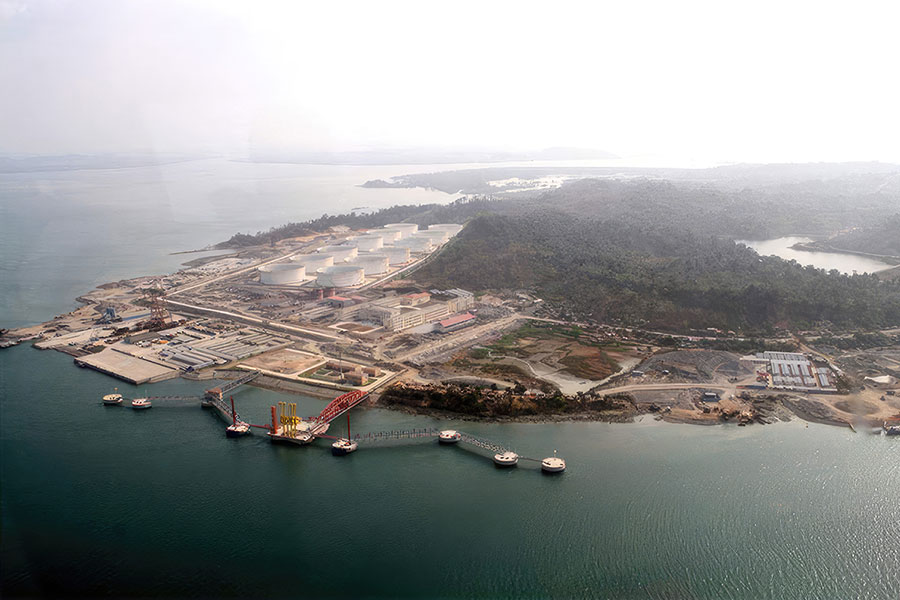
By DMG
The regime currently governing Myanmar, which took power in a February 2021 coup and China have been pushing for the construction of Kyaukphyu Special Economic Zone (SEZ) and deep-sea port in southern Arakan State amid the deepening crisis in military-controlled Myanmar.
Residents and those monitoring foreign investments in Arakan State said the regime is offering Kyaukphyu to China in exchange for its help in resolving Myanmar's political and military crises.
U Tun Kyi, director of the Center for Peace and Development (CPD), which is monitoring investment projects in Arakan State said: "The regime can't resist AA's attacks in Arakan State. It wants to protect Kyaukphyu with help from China. It wants to use the deep-sea port project as a shield."
Eight officers from the Chinese Embassy in Yangon flew to Kyaukphyu the second week of June to check oil and gas pipelines in Maday Island and make initial observations for the implementation of the SEZ. They spent three days there.
Deal between the junta and Beijing
As crises deepen in Myanmar, the regime has primarily turned to Russia and China for help, said analysts.
The Arakkha/Arakan Army (AA) has made sweeping gains since launching the anti-regime Operation 1027 offensive in November last year. It has captured nine townships in Arakan State and one (Paletwa Township) in Chin State.
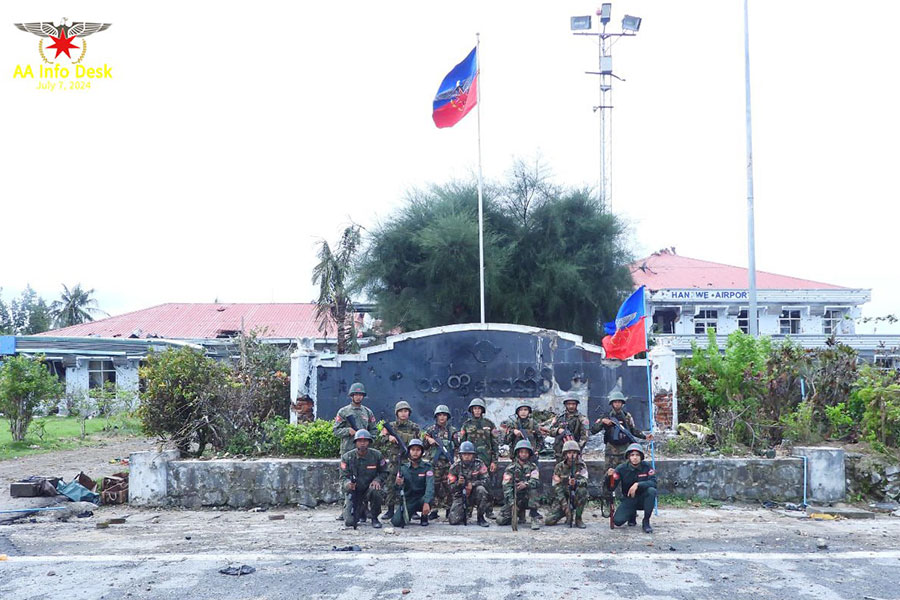
Amid these gains, bilateral ties between the junta and China are improving, both materially and diplomatically. Beijing gave six patrol boats to the regime on June 11 for cooperation in the rule of law and protection of mutual interests. Three days later, the two sides signed an agreement for China to provide the junta with US$ 3.6 million under the Mekong-Lancang Cooperation Fund.
Then, in late June, former president ex-general U Thein Sein attended an event to commemorate the 70th anniversary of the adoption of Five Principles of Peaceful Co-Existence in Beijing at the invitation of the Chinese government.
The junta's second-in-command Vice-Senior General Soe Win also paid a two-day visit to China, the first official visit since the coup. He and Chinese officials discussed speedy implementation and protection of China-backed projects in Myanmar, junta media reported.
Kyaukphyu SEZ
Kyaukphyu SEZ is located in Arakan State's Kyaukphyu Township and consists of three components-a deep-sea port, an industrial park and an integrated residential area.
The project is part of China's Belt and Road Initiative and is designed to provide China with direct access to the Indian Ocean, facilitating a more direct route for Middle Eastern oil imports that could spur development in China's landlocked Yunnan Province.
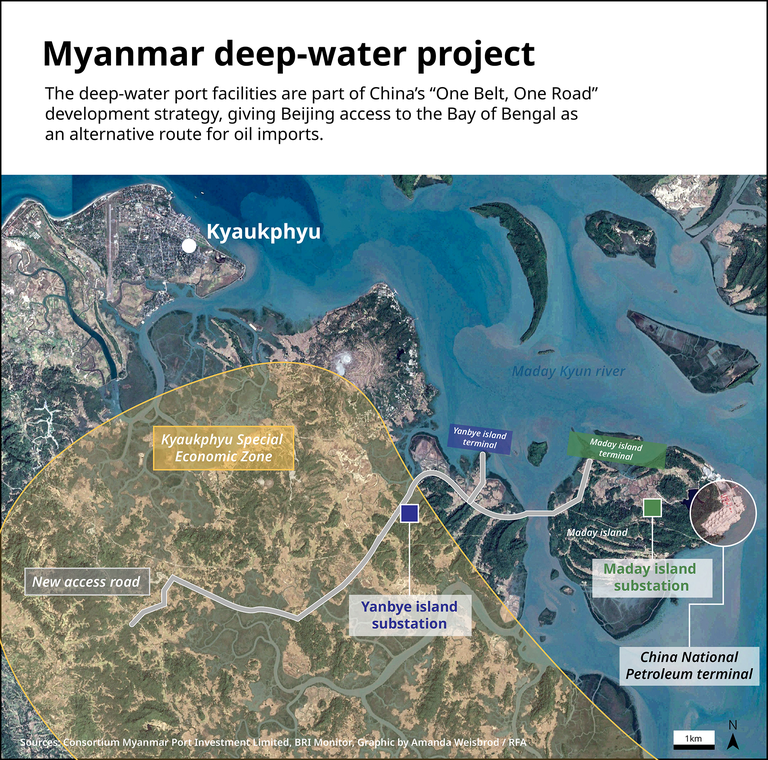
Political and economic analysts are watching to see if the Chinese government and Myanmar regime's steps along with political and military developments in Arakan State will lead to a big change. "If the Kyaukphyu SEZ can be implemented, there will be many benefits for the Myanmar military regime. This project is getting millions more per month than other projects, so the Myanmar military regime is trying to implement it," U Than Soe Naing, political analyst, commented.
There is yet another BRI project in Kyaukphyu-a railroad linking the town with Yunnan Province.
With approval from the government and parliament, the China International Trust and Investment Corporation (CITIC) won contracts for the deep-sea port and SEZ projects in December 2015. The budget for the project is US$ 7.3 billion.
The CITIC initially took an 85 percent stake in the project and Myanmar took the 15 percent, according to the agreement signed with the former U Thein Sein administration in 2013. The National League for Democracy (NLD) government renegotiated the agreement to increase Myanmar's stake to 30 per cent in November 2018.
Then, in May 2021, the Kyaukphyu SEZ Management Committee was reorganized to appoint former transport minister U Myint Thein as committee chairman and Arakan State military council member U San Shwe Maung as deputy chairman. The committee also consists of officials from the Urban and Housing Development Department, Kyaukphyu District General Administration Department and Myanmar Port Authority (Arakan State).
According to the Myanmar Special Economic Zone Central Committee, 4289.32 acres (1735.83 hectares) of land has been earmarked for the Kyaukphyu SEZ. The deep-sea port covers 607.88 acres, the industrial park covers 2446.07 acres and the residential area covers 1235.37 acres.
However, that project area also includes farmland, cropland, pastures and bodies of water in nine village-tracts in Kyaukphyu and Ramree Island.
Farmer U Hla Thein from Pyar Tae village in Kyaukphyu Township said: "We were told since 2015 that farms near our village were confiscated. Surveys were also carried out. Chinese people were also involved in surveys. But there is still no information publicly available to farmers."
A woman farmer from Kanni village in Kyaukphyu Township said: "The township administrator said our farms would be confiscated to make way for the project. We still don't know how many acres exactly will be confiscated."
Preparations have been made since the National League for Democracy (NLD) government to seize 250 acres of land for the Kyaukphyu SEZ industrial zone. The 250 acres of land near Sittaw Junction on the Kyaukphyu-Yangon Road to be confiscated includes land belonging to more than 72 landowners from four village-tracts. Of the 250 acres targeted for confiscation, about 90.4 acres is farmland, 29.3 acres is garden land, 68.7 acres is pastureland, and 61.6 acres is said to be vacant land, according to statistics issued by the Kyaukphyu District General Administration Department.
Hired by the CITIC, the Myanmar Survey Research (MSR) has conducted its social and environmental impact assessment (SEIA) of the SEZ.
An addendum to the concession agreement for the deep-sea port project was signed on December 26 last year in Naypyitaw.
"As for us, we do not yet know how compensation will be paid to individual farmers. We have no idea whether the government or the company will be responsible for compensating the farmers," U Hla Thein explained.
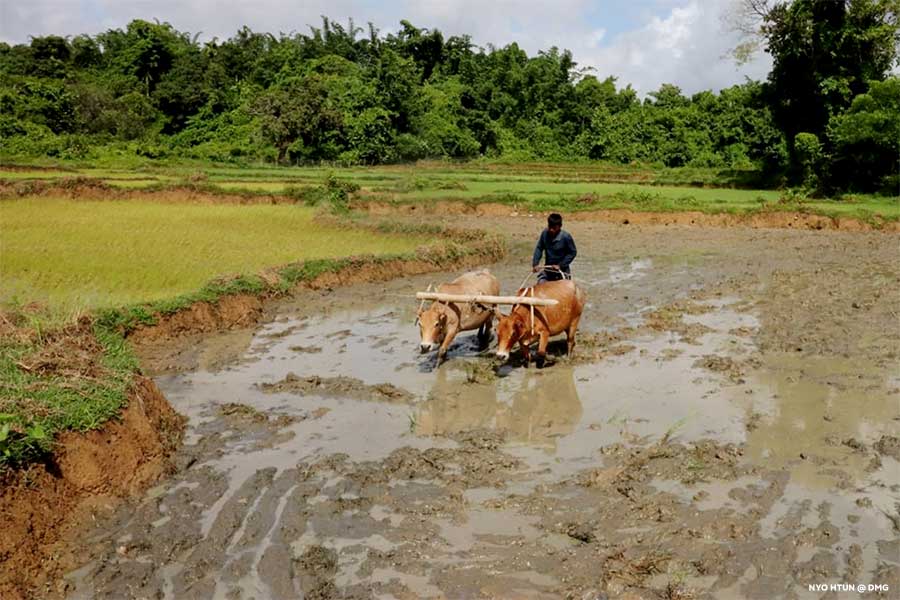
There are more than 100 acres of land owned by local people in the first farmland to be confiscated, and the land to be confiscated now includes more than 60 acres owned by three unknown people. According to a statement issued by the NLD government that compiled lists of confiscated lands, the General Administration Department identified 22 local landowners as occupiers.
In the Kyaukphyu SEZ border area, farmers have incomplete proofs of ownership for farmlands that have been worked by their ancestors for generations. Departments have rejected claims of land ownership, and people who know the law have acquired the land together with the departments.
"It is impossible for all farmers to get compensation because some of the first 11 acres of land to be taken from Kyaukphyu SEZ have been decided as agricultural land, grazing land, and other land," said Ko Aung San, a local resident.
At that time, local farmers joined organizations and asked the government to pay compensation and replace the land, but to no avail, said U Hla Thein, chairman of the Kyaukphyu Rural Development Association.
"Some of the local people are farming without knowing when their fields will be confiscated," said a female farmer from Kanni Village.
Currently, the AA has blocked the entire Kyaukphyu Township from where Chinese projects are located, and there are frequent clashes. China is concerned that Chinese projects and interests in Kyaukphyu will be affected by fighting in Arakan State, and has warned the military regime and the AA to protect its projects.
Sino-Myanmar pipelines
Known as the "Sino-Myanmar pipelines," the nearly 500-mile-long oil and natural gas pipelines originate in Maday Island, Kyaukphyu Township, and pass through the Magway and Mandalay Regions and northern Shan State to Kunming, China.
Political analysts said that since 2013, the project has generated a lot of foreign income for successive Myanmar governments, and coup leader Min Aung Hlaing has also benefited from the project.
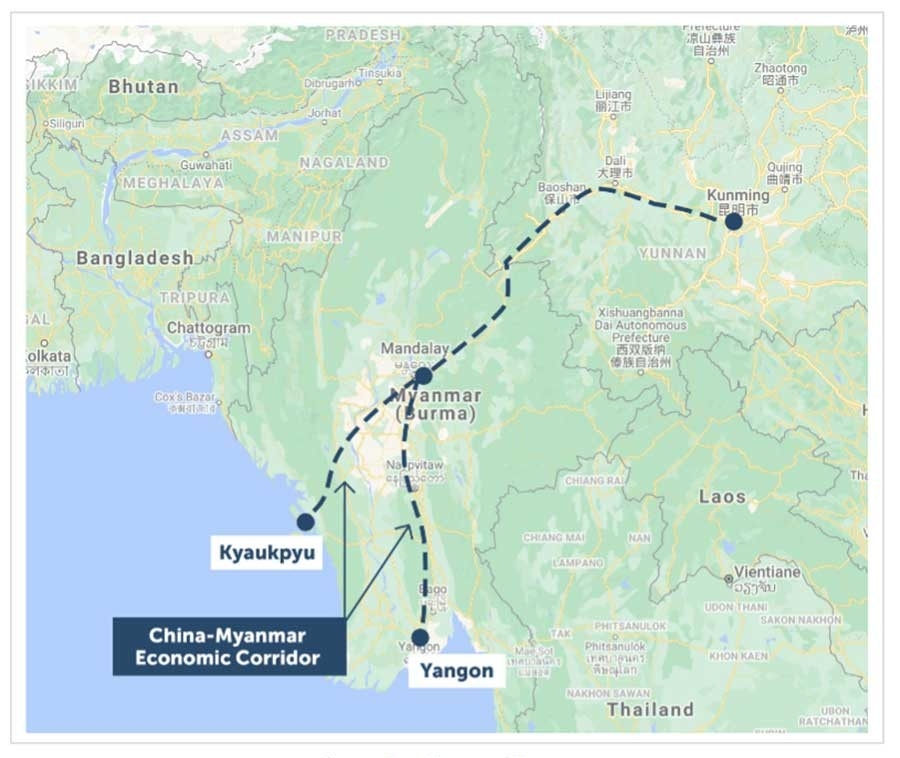
According to data from ISP Myanmar, the oil pipeline project between the state-owned Myanmar Oil and Gas Enterprise and the China National Petroleum Corporation is expected to export 22 million tons of oil per year. The oil and gas pipeline is 771 kilometers (480 miles) long and currently exports more than 16,000 tons of crude oil daily, ISP Myanmar said.
Four countries- Myanmar, China, Korea and India- are benefiting from the 400 million cubic meters of natural gas that flow from the pipeline daily.
In the fiscal year 2018-19, the Myanmar government received US$42.965 million from the gas export pipeline project and US$64.174 million from the oil pipeline project, totaling more than US$107 million, according to project reports.
Analysts say that the military regime is mainly relying on the oil and natural gas industry to generate income when foreign currency is low due to the departures of foreign companies after the military coup, the suspension of foreign loans, the decrease in manufacturing production, the decrease in export income, and the absence of foreign investment.
According to Blood Money, a group opposed to the Myanmar military regime, the oil and gas sector generated $2.25 billion in revenue in the two years since the coup.
"This money is spent on fighting with anti-coup forces for the military regime. Reports show that the military regime's weapons and fuel purchases come from here. In fact, the income from this project is helping the regime to kill people," said a former lawmaker in Arakan State.
In the first six months of 2019, Sino-Myanmar pipelines exported more than 5 million tons of oil to China, an increase of 2.7 percent compared to the first six months of 2018, according to the customs department of Kunming, Yunnan Province, based on research provided by ISP Myanmar.
While large sums have flowed to the regime, locals have not seen benefits.
"We lost our farmlands. We are banned from going outside. The locals are still poor," said U Kyaw Kyaw, a resident of Maday Island.
But according to local residents, the regime has already approved the construction of two large reservoirs in Maday Island for the Kyaukphyu SEZ at a cost of over K40 billion or around $1 million USD.
"Currently, sand from Tanintharyi Region is being sent to Maday Island. I don't know exactly whether China will build a port or not," said an ex-legislator in Kyaukphyu.
Chinese-backed projects in Kyaukphyu are multi-million dollar projects for China, which are geopolitically important for China to gain an advantage over India.
A veteran Arakanese businessman said, "Foreign projects are directly related to the country's stability. But both sides have not yet begun the intensity of the battle in Kyaukphyu. Kyaukphyu SEZ is a big project that will have a hard start."






.jpg)













